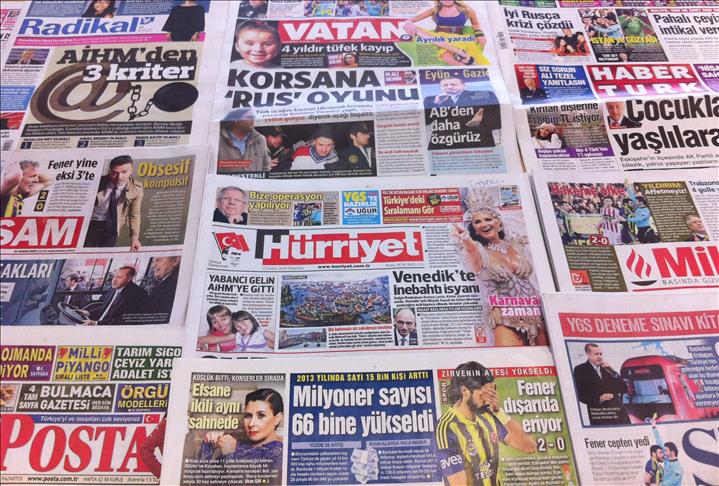Turkish Press Review
Turkish dailies on Monday cover the hostage negotiation between the police and a Ukrainian citizen who attempted to hijack a Turkish passenger jet on Friday en route from Ukraine to Turkey, with the aim of diverting it to the

ANKARA
Anadolu Agency does not verify these stories and does not vouch for their accuracy.
Turkish dailies on Monday cover a varied selection of stories including the hostage negotiation between the police and a Ukrainian citizen who attempted Friday to hijack a Turkish passenger jet en route from Ukraine to Turkey, with the aim of diverting it to the Russian city of Sochi, where the Winter Olympic Games are under way; and Prime Minister Erdogan's comments on protests against the new Internet law.
"Russian game with hijacker," headlined Vatan. Police hostage negotiator Celalettin Demirci led talks with the Ukrainian citizen for four hours, and stalled for time by saying that Russian officials the Ukrainian hijacker demanded were delayed, the plane was eventually evacuated, the daily said.
Artem Kozlov wanted to speak with Russian authorities, and Demirci stalled him by saying that the Russians were stuck in traffic, during which a special squad entered the plane and searched for the bomb Kozlov claimed was in the freight compartment, Vatan wrote.
No bomb was found, and the passengers were evacuated. Koslov was arrested, and could face an imprisonment of up to 15 years, the daily added.
"Good Russian skills solve the crisis," was Haberturk's headline referring to Demirci's fluent Russian which helped the Turkish hostage negotiator persuade Koslov to surrender at the end of a four-hour-long negotiation process.
The hijacking attempt was diverted successfully with the efforts of a 5-member negotiating team, and it was the team's first mission in such circumstances, the daily said.
"I hijacked that plane because its (departure) time was suitable," Haberturk quoted Kozlov as saying.
Prime Minister Recep Tayyip Erdogan's comments on protests against the new Internet law that was passed the week before is another topic that was covered by several dailies on Monday.
Vatan went with the headline "We are freer than the EU," quoting Erdogan as he talked at the foundation laying ceremony of a new metro line in Istanbul on Sunday.
Regarding protests in Istanbul's Taksim Square over the weekend against the new Internet law which was passed on Wednesday, Vatan quoted Erdogan as saying "They are taking to the streets, chanting 'leave our indecent images.'''
The Turkish daily Star in an article published on Sunday labeled groups opposing the new Internet law as a 'porn lobby', claiming that those who opposed a 2011 safe Internet policy - which prevented children accessing porn sites - are the same 'porn lobby' calling on the Turkish president to veto the new Internet law.
In Turkey, laws passed by the parliament take effect only after the country's president approves them. The president either approves a law or vetoes it and sends it back to the parliament for further debate. The parliament may introduce changes to the law as specified by the president or re-pass the law without making any amendments to it. In the latter case, the president cannot not veto the legislation for a second time.
"They take to the streets without understanding what the law is about, and the parallel structure supports them," Radikal quotes Erdogan referring to the so-called "parallel state" - a so-called 'state within the state' nestled in the judiciary and the police which the Turkish government says is plotting against it.
The Internet law, passed Wednesday by the Turkish parliament, grants the Turkey's communications regulating authority the right to block access to websites without first seeking a court order. The official cyberspace authority will be able to block access within four hours when it deems a particular website violates privacy or includes 'harmful' content upon an application by an individual or organisation to the agency.
The law also obliges Internet service providers to archive Internet traffic for up to two years, and the Internet watchdog, the Telecommunications Communications Presidency, will be able to ask Internet service providers to submit users' communications and traffic information to the agency.
englishnews@aa.com.tr
Anadolu Agency website contains only a portion of the news stories offered to subscribers in the AA News Broadcasting System (HAS), and in summarized form. Please contact us for subscription options.

